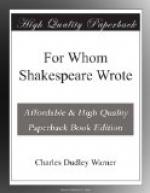so vanished away. This was examined before Sir
George Norton, and sworn by four honest men that saw
it, to be true.” Equally well substantiated,
probably, was what happened in Herefordshire in 1571:
“A field of three acres, in Blackmore, with
the Trees and Fences, moved from its place and passed
over another field, traveling in the highway that
goeth to Herne, and there stayed.” Herefordshire
was a favorite place for this sort of exercise of nature.
In 1575 the little town of Kinnaston was visited by
an earthquake: “On the seventeenth of February
at six o’clock of the evening, the earth began
to open and a Hill with a Rock under it (making at
first a great bellowing noise, which was heard a great
way off) lifted itself up a great height, and began
to travel, bearing along with it the Trees that grew
upon it, the Sheep-folds, and Flocks of Sheep abiding
there at the same time. In the place from whence
it was first moved, it left a gaping distance forty
foot broad, and fourscore Ells long; the whole Field
was about twenty Acres. Passing along, it overthrew
a Chappell standing in the way, removed an Ewe-Tree
planted in the Churchyard, from the West into the
East; with the like force it thrust before it High-wayes,
Sheep-folds, Hedges, and Trees, made Tilled ground
Pasture, and again turned Pasture into Tillage.
Having walked in this sort from Saturday in the evening,
till Monday noon, it then stood still.”
It seems not improbable that Birnam wood should come
to Dunsinane.
It was for an age of faith, for a people whose credulity
was fed on such prodigies and whose imagination glowed
at such wonderful portents, that Shakespeare wrote,
weaving into the realities of sense those awful mysteries
of the supernatural which hovered not far away from
every Englishman of his time.
Shakespeare was born in 1564, when Elizabeth had been
six years on the throne, and he died in 1616, nine
years before James I., of the faulty spleen, was carried
to the royal chapel in Westminster, “with great
solemnity, but with greater lamentation.”
Old Baker, who says of himself that he was the unworthiest
of the knights made at Theobald’s, condescends
to mention William Shakespeare at the tail end of the
men of note of Elizabeth’s time. The ocean
is not more boundless, he affirms, than the number
of men of note of her time; and after he has finished
with the statesmen ("an exquisite statesman for his
own ends was Robert Earl of Leicester, and for his
Countries good, Sir William Cecill, Lord Burleigh"),
the seamen, the great commanders, the learned gentlemen
and writers (among them Roger Askam, who had sometime
been schoolmaster to Queen Elizabeth, but, taking
too great delight in gaming and cock-fighting, lived
and died in mean estate), the learned divines and
preachers, he concludes: “After such men,
it might be thought ridiculous to speak of Stage-players;
but seeing excellency in the meanest things deserve
remembring, and Roscius the Comedian is recorded in




